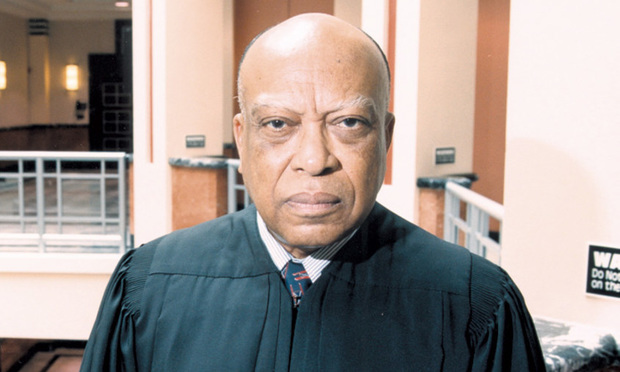Medical Device Makers' Patent Infringement Battle Yields $13M Fee Award
U.S. District Judge William Walls made the award to Zimmer as the prevailing party after four patents that Howmedica claimed were infringed were found to be invalid.
May 24, 2018 at 04:55 PM
4 minute read

A Newark, New Jersey, federal judge has awarded $13.8 million in fees and costs to Zimmer Inc. after it came out the victor in a 13-year patent infringement battle with Howmedica Osteonics Corp.
U.S. District Judge William Walls made the award to Zimmer as the prevailing party after four patents that Howmedica claimed were infringed were found to be invalid. The patents, all carrying the title “non-oxidizing medical implant,” concern irradiating and heating polymers used in medical implants in order to extend the usable life of those implants. The suit said Zimmer sold products that infringed on Howmedica's patents.
Walls granted Zimmer $13,296,559 in fees, which is nearly all the $13.5 million it sought, and granted the entire $513,258 in costs that the company sought. But he rejected outright Zimmer's request for $1.01 million in expert fees and for $5.8 million in prejudgment interest.
Walls awarded fees and costs after finding the litigation met the standard for an “exceptional case.” The judge said that standard was met for a variety of reasons. Among them was that an individual who testified before a patent examiner in the case on behalf of Howmedica, Aiguo Wang, failed to disclose at trial that he was an employee of that company. Walls also found that the case was exceptional because Howmedica failed to withdraw its infringement claims once it knew they were baseless, and the judge cited “selective disclosure of data and evasive responses” to a patent examiner by Howmedica.
Howmedica, for its part, argued that it had simply lost “11 years of hard-fought litigation between sophisticated competitors” over groundbreaking medical implants.
Walls ruled in 2007 that three of the patents were invalid, and the U.S. Court of Appeals for the Federal Circuit affirmed his ruling in 2010. In 2009, Zimmer sought a re-examination of claims in the fourth patent, and the U.S. Patent and Trademark Office rejected the claims in that patent.
Howmedica, a maker of orthopedic devices, was acquired in 1998 by Stryker Corp. of Kalamazoo, Michigan. It claimed in the suit that Zimmer infringed its process for irradiating and heat-treating medical implant materials. Although this process was not novel, Howmedica claimed that its process of heating the materials at 50 degrees celsius for 144 hours was superior to similar methods. But Howmedica withheld key information from federal patent examiners during the course of the litigation, prompting their patents to be invalidated, according to court documents.
Zimmer, a maker of medical devices now known as Zimmer Bionet, is based in Warsaw, Indiana.
Howmedica has indicated that it will appeal the final judgment to the U.S. Court of Appeals for the Federal Circuit, according to court documents.
Zimmer was represented by lawyers from Kirkland & Ellis, Latham & Watkins and Tompkins, McGuire, Wachenfeld & Barry of Roseland, New Jersey. Walls said the Am Law 50 average was an appropriate basis for evaluating the hourly rates claimed by counsel from Kirkland & Ellis and Latham & Watkins, citing the highly specialized area of law, the expertise required and what he termed the “exorbitant” $2 billion in damages sought by Howmedica in the case. Some Kirkland & Ellis lawyers charged as much as $1,295 per hour, but Walls said, “The court also finds any billing rate over $900 to be unreasonable,” and he cut three lawyers down to that rate—Mark Pals, Bryan Hales and David Callahan.
Walls issued an order in the case announcing his ruling on April 24, but the reasons for his ruling were unknown until he unsealed a 39-page opinion on Wednesday.
Lawyers representing Zimmer did not return calls about the fee award. Nor did lawyers at Gibbons in Newark and at McAndrews, Held & Malloy in Chicago, who represented Howmedica. Representatives at Howmedica and at Zimmer also did not return calls about the case.
This content has been archived. It is available through our partners, LexisNexis® and Bloomberg Law.
To view this content, please continue to their sites.
Not a Lexis Subscriber?
Subscribe Now
Not a Bloomberg Law Subscriber?
Subscribe Now
NOT FOR REPRINT
© 2025 ALM Global, LLC, All Rights Reserved. Request academic re-use from www.copyright.com. All other uses, submit a request to [email protected]. For more information visit Asset & Logo Licensing.
You Might Like
View All
Lack of Jurisdiction Dooms Child Sex Abuse Claim Against Archdiocese of Philadelphia, Says NJ Supreme Court
5 minute read
An Overview of Proposed Changes to the Federal Rules of Procedure Relating to the Expansion of Remote Trial Testimony
15 minute read
Appellate Division Rejects Third Circuit Interpretation of NJ Law, Says No Arbitration for Insurance Fraud
4 minute read
Trending Stories
- 1Wilmer, White & Case, Crowell Among the Latest to Add DC Lateral Partners
- 2Advance Auto Parts Hires GC Who Climbed From Bottom to Top of Lowe's Legal Department
- 3Judge Rules Georgia Railroad Can Seize Land as Landowners Vow to Fight
- 4On the Move and After Hours: Einhorn Barbarito; Gibbons; Greenbaum Rowe; Pro Bono Partnership
- 5On The Move: Squire Patton Boggs, Akerman Among Four Firms Adding Atlanta Partners
Who Got The Work
J. Brugh Lower of Gibbons has entered an appearance for industrial equipment supplier Devco Corporation in a pending trademark infringement lawsuit. The suit, accusing the defendant of selling knock-off Graco products, was filed Dec. 18 in New Jersey District Court by Rivkin Radler on behalf of Graco Inc. and Graco Minnesota. The case, assigned to U.S. District Judge Zahid N. Quraishi, is 3:24-cv-11294, Graco Inc. et al v. Devco Corporation.
Who Got The Work
Rebecca Maller-Stein and Kent A. Yalowitz of Arnold & Porter Kaye Scholer have entered their appearances for Hanaco Venture Capital and its executives, Lior Prosor and David Frankel, in a pending securities lawsuit. The action, filed on Dec. 24 in New York Southern District Court by Zell, Aron & Co. on behalf of Goldeneye Advisors, accuses the defendants of negligently and fraudulently managing the plaintiff's $1 million investment. The case, assigned to U.S. District Judge Vernon S. Broderick, is 1:24-cv-09918, Goldeneye Advisors, LLC v. Hanaco Venture Capital, Ltd. et al.
Who Got The Work
Attorneys from A&O Shearman has stepped in as defense counsel for Toronto-Dominion Bank and other defendants in a pending securities class action. The suit, filed Dec. 11 in New York Southern District Court by Bleichmar Fonti & Auld, accuses the defendants of concealing the bank's 'pervasive' deficiencies in regards to its compliance with the Bank Secrecy Act and the quality of its anti-money laundering controls. The case, assigned to U.S. District Judge Arun Subramanian, is 1:24-cv-09445, Gonzalez v. The Toronto-Dominion Bank et al.
Who Got The Work
Crown Castle International, a Pennsylvania company providing shared communications infrastructure, has turned to Luke D. Wolf of Gordon Rees Scully Mansukhani to fend off a pending breach-of-contract lawsuit. The court action, filed Nov. 25 in Michigan Eastern District Court by Hooper Hathaway PC on behalf of The Town Residences LLC, accuses Crown Castle of failing to transfer approximately $30,000 in utility payments from T-Mobile in breach of a roof-top lease and assignment agreement. The case, assigned to U.S. District Judge Susan K. Declercq, is 2:24-cv-13131, The Town Residences LLC v. T-Mobile US, Inc. et al.
Who Got The Work
Wilfred P. Coronato and Daniel M. Schwartz of McCarter & English have stepped in as defense counsel to Electrolux Home Products Inc. in a pending product liability lawsuit. The court action, filed Nov. 26 in New York Eastern District Court by Poulos Lopiccolo PC and Nagel Rice LLP on behalf of David Stern, alleges that the defendant's refrigerators’ drawers and shelving repeatedly break and fall apart within months after purchase. The case, assigned to U.S. District Judge Joan M. Azrack, is 2:24-cv-08204, Stern v. Electrolux Home Products, Inc.
Featured Firms
Law Offices of Gary Martin Hays & Associates, P.C.
(470) 294-1674
Law Offices of Mark E. Salomone
(857) 444-6468
Smith & Hassler
(713) 739-1250






